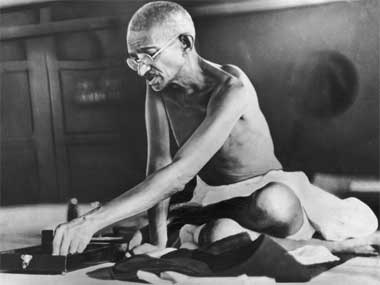Mahatma Gandhi never made a fetish of consistency. Far from it, he described his inconsistencies as the result of his gradual evolution as a man. Those who have read his collected works or biographies that are aplenty these days would not find anything extraordinary in the new book (The South African Gandhi: Stretcher-bearer of Empire) that calls him “racist” . Gandhi went to South Africa as a failed barrister from India, and was determined to make it big. His sartorial preferences and tastes were carefully cultivated to match the British. Since he had studied in England, he easily made friends with the Whites. He made no bones about this in his autobiography. [caption id=“attachment_2424194” align=“alignleft” width=“380”]  Getty Image[/caption] Similarly, with his role in the Boer war Gandhi. It is part of recorded history that he sided with the British. Even in World War I, he was apparently with the Empire and had encouraged Indian participation. In fact, the past one decade saw a wide of range of biographies and anthologies which examined Gandhi’s actions, words and politics with microscopic details. His grand son Rajmohan Gandhi revealed about his liaison with the niece of Rabindra Nath Tagore and subsequent run-in with C Rajagopalachari. Then there were several myths about Gandhi that were busted by another grandson Gopal Krishna Gandhi. More recently US journalist Jospeh Lelyveld wrote yet another biography on Gandhi after researching a ream of documents in South Africa , UK and India. He came out with insinuations about Gandhi’s non-conformist sexuality. His book ‘Great Soul’ also referred to Gandhi’s racist behaviour as a lawyer in South Africa. Lelyveld’s book suggested a preconceived objective to shock his readers. Lelyveld succeeded to an extent, but not beyond. Apparently, the problem with Gandhi is that he was never shy of his human vulnerabilities. Contrarily, he encouraged people to talk about it and do a threadbare analysis to put him down from the saintly pedestal. His disciples left him when he undertook his ‘celibacy experiments’ in the company of younger women. He did not try to convince them, but allowed them to choose their way. Just a few days before he was shot dead, Gandhi declared that all his experiments would come to a nought should he utter any word other than ‘Ram’ when confronted with violent death. Gandhi was conscious of the fact that he might even err in his death. That is the precise reason that his guiding principle was that no man is good till he is dead. All thorough his life, Gandhi erred and corrected himself like an ordinary human being. He never claimed to be born with any attributes superior to an ordinary mortal. He was lampooned not just by the likes of Winston Churchill who called him as ‘half-naked Fakir’ but was deserted even by his colleagues on the issue of Partition dismissing him as an idiosyncratic old man. Gandhi died liked an ordinary mortal, just the way he lived. If one is determined to recount weaknesses of Gandhi’s life, ‘racist’ and ‘pro-British’ would count among the kinder epithets. Gandhi subjected himself to criticism of a far more serious nature. Therein lies his greatness.
Mahatma Gandhi never made a fetish of consistency. Far from it, he described his inconsistencies as the result of his gradual evolution as a man.
Advertisement
End of Article


)
)
)
)
)
)
)
)
)



